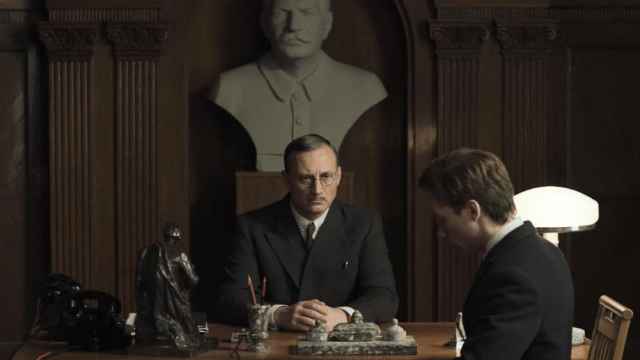The British historian James Howell had this to say about the art of translation:
Some hold translations not unlike to be
The wrong side of a Turkey tapestry.
Perhaps that is true if you translate like Howell wrote poetry. But, fortunately, it doesn't have to be that way.
Take Sergei Task, for instance. Task is a playwright and translator whose resume is as long as one of those old scrolls that Howell probably used to write on.
Task has translated the plays, prose, poetry and film scripts of Sam Shepard, Stephen King, H.W. Longfellow, J.D. Salinger, George Orwell, Arthur Kopit, Peter Greenaway, David Mamet, Kurt Vonnegut, Studs Terkel, Neil Simon, David Hare &mdash and I am only just getting started.
I once attended the Moscow premiere of Richard Baer's "Mixed Emotions," as translated by Task. The audience was beside itself with mirth. Constant bursts of laughter began almost immediately and continued unabated throughout the performance.
I will take nothing from Richard Baer, who in his lifetime was famous for writing some of America's most popular sitcoms &mdash "Leave it to Beaver" and "Bewitched" among them &mdash but nothing translates with more difficulty than humor.
The laughter enjoyed by the Moscow audience of "Mixed Emotions" was induced primarily by the choices Task made as a translator. The words he found in Russian to approximate Baer's originals were impeccable.
I recently had a chat with Sergei and I asked him to talk about his work a little.
Sergei received an MFA in playwriting from the University of Iowa in 1996. He lived and taught in the United States for several years, but returned to Russia at the end of the 1990s to open a play and translation agency he called WILL &mdash that is as in WILLiam Shakespeare, as well as in "having the will power" to get something done, I might add.
Through his agency Sergei has translated over three dozen plays by authors from the United States, Britain and New Zealand. Productions of these translations have been produced all over Russia.
According to Sergei, in order for any play to start a new life in a new language and culture, it must be "reborn."
"You reinvent the situations, you create new tensions between characters 'as if' you are creating a new play," he states.
"As if" is the key phrase here, according to Task. A translator, he suggests, can never lose sight of the fact that he is creating a new work even as he is recreating a work that already exists.
Sergei attributes his ability to hear a potential performance in his head when he looks at a script to the fact that he grew up in a theatrical family. His father was a theater director and his mother was an actress.
On occasion friendships arise between Sergei and the writers he translates, as happened with the American playwright Arthur Kopit.
"Kopit calls me his Doppelganger," Task relates, "his brother-twin."





